Key takeaways:
- Feel-good movies center on uplifting narratives, relatable characters, and universal themes like friendship and resilience that evoke positive emotions.
- The emotional journeys of characters can mirror personal experiences, fostering self-reflection and inspiring viewers towards personal growth and hope.
- Humor in feel-good films enhances emotional engagement, making challenges more relatable and creating a shared sense of community among viewers.
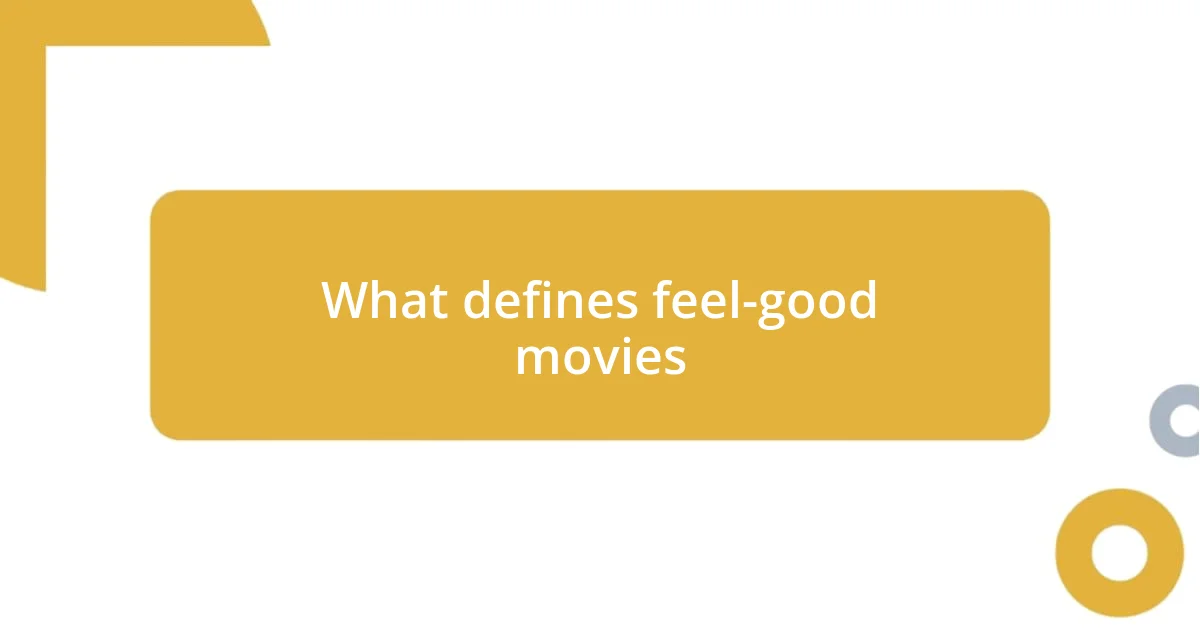
What defines feel-good movies
Feel-good movies typically offer an uplifting narrative that instills hope and joy, often culminating in a happy resolution. I have fond memories of cozy movie nights, where a heartfelt film instantly lifted my spirits, leaving me with a smile long after the credits rolled. Isn’t it fascinating how a simple story can profoundly affect our mood?
Another defining feature is relatable characters who embark on personal journeys of growth, resilience, and love. I vividly recall watching a film where the protagonist overcame seemingly insurmountable challenges—each triumph resonated deeply with me. Have you ever felt inspired by a character’s journey and found echoes of your own dreams within those moments?
Finally, feel-good movies frequently evoke a sense of nostalgia or a connection to universal themes of friendship, family, and community. I remember feeling a wave of warmth while watching a classic film that celebrated the bonds of friendship, reminding me of my own cherished relationships. How does a good movie sweep you off your feet and transport you to a place of pure joy?
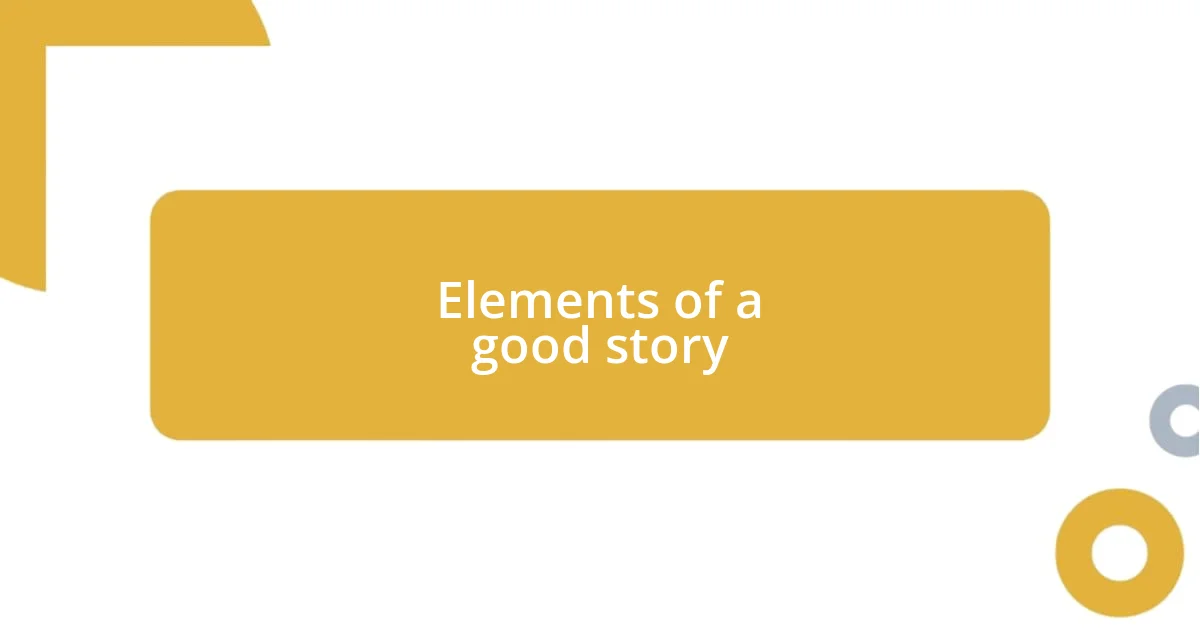
Elements of a good story
Stories in feel-good movies thrive on emotional resonance. I often find that when I’m deeply connected to the characters, their victories feel like my own. For instance, I recently watched a film where the lead not only achieved their dreams but did so while overcoming anxiety. Their journey mirrored my own struggles, and I cannot describe the relief I felt seeing my experiences reflected on screen. It’s incredible how a good story can illustrate the power of vulnerability and triumph.
Conflict, of course, is essential to storytelling. Yet, in feel-good movies, it’s often paired with a sense of hope. There was a time when I watched a heartfelt comedy-drama that masterfully balanced tension with humor. The protagonist navigated through job loss while attempting to hold onto their family, making me laugh through my own challenges. This mixture of conflict and resolution can lift spirits, reminding us that light follows dark, even in the toughest moments.
Character development can’t be overlooked. The growth of characters throughout the narrative often mirrors our own life journeys. I will never forget a film that showcased a character evolving from self-doubt to self-acceptance. Watching them embrace their flaws and ultimately love themselves echoed my own path toward self-confidence. It really emphasizes that storytelling, at its core, is about reflecting the human experience.
| Element | Description |
|---|---|
| Emotional Resonance | A character’s journey that reflects our own struggles and triumphs. |
| Conflict with Hope | Challenges faced by characters that are balanced with humor and positivity. |
| Character Development | Shows growth from self-doubt to self-acceptance, mirroring personal journeys. |
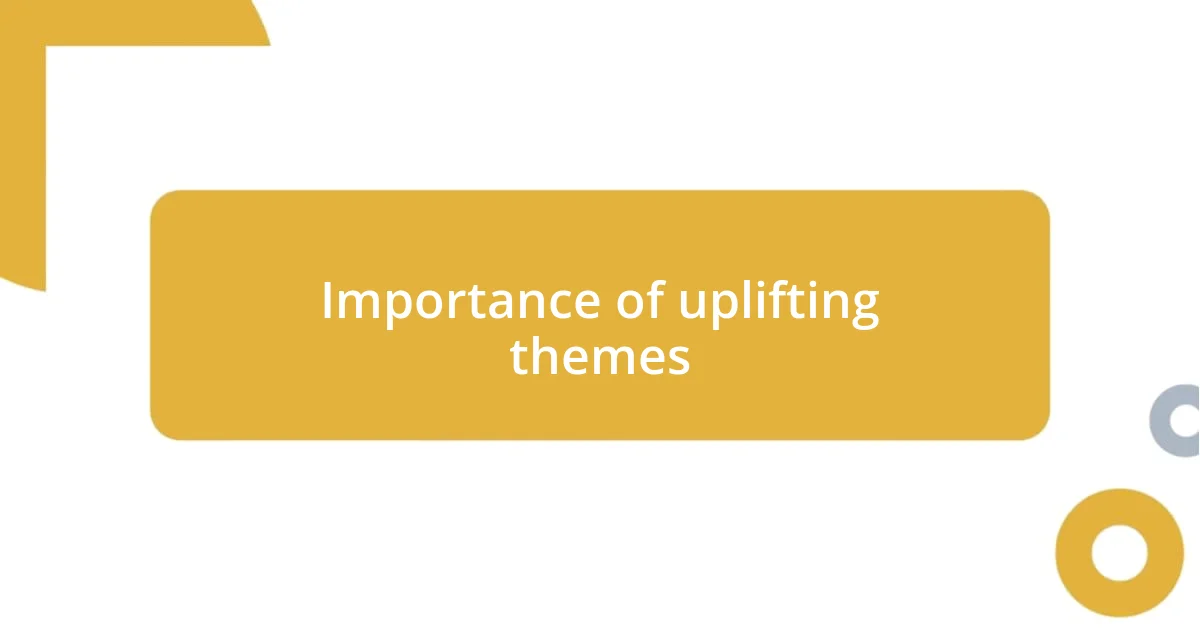
Importance of uplifting themes
Uplifting themes in feel-good movies play a crucial role in shaping our emotional landscapes. They help us navigate life’s challenges by embedding messages of resilience and hope. I remember watching a film centered on the power of kindness, and it inspired me to pay it forward in my own life. Those moments remind me how a single feel-good movie can spark a desire to create positivity in the world around us.
Consider these important aspects of uplifting themes:
- Encouragement: Uplifting themes inspire viewers to face their own struggles with courage.
- Connection: They foster a sense of community, reminding us we’re not alone in our battles.
- Joy: These themes often spark joy, creating a lasting impact on our mood and perspective.
Each time I walk away from a movie with an uplifting message, I find myself reflecting on my own experiences and how I can incorporate that sense of optimism into my daily routine. It’s truly fascinating how these themes stick with us long after the film has ended.
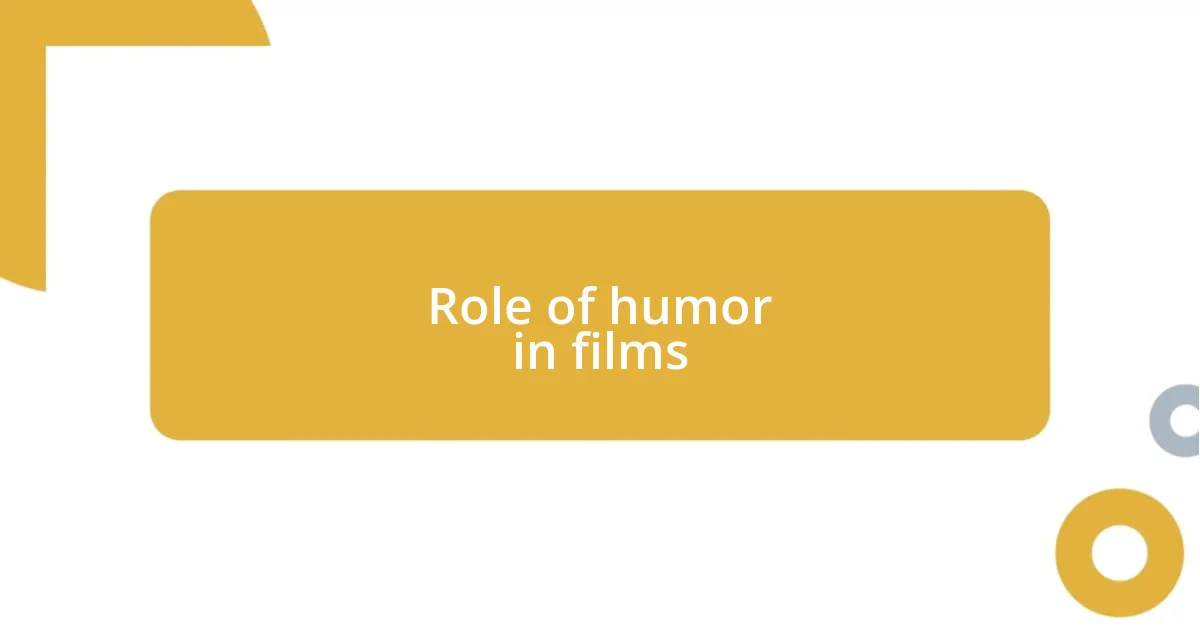
Role of humor in films
Humor in films serves as a vital ingredient that can transform a simple story into an unforgettable experience. I find that laughter has this remarkable ability to break down barriers, allowing me to connect with characters on a deeper level. Have you noticed how a well-timed joke can instantly lighten even the heaviest of situations? For me, watching a comedy that balances humor with real-life challenges—like a character fumbling through a disastrous date—reminds me that laughter often lives right beside our struggles.
When humor is woven into a narrative, it not only brings joy but also highlights the absurdity of life. I recall a feel-good movie where the protagonist faces a string of unfortunate events, all while maintaining a witty attitude. Each comic mishap not only entertained me but also made me reflect on my own moments of clumsiness. It’s comforting to see that laughter can coexist with hardship, reminding me that we can find lightness amidst chaos.
Furthermore, humor can enhance the emotional punch of a story. Remember a scene that made you laugh out loud, only to switch gears and pull at your heartstrings moments later? I think back to a film where the characters shared hilarious banter while dealing with family tensions. That juxtaposition made the emotional resolution even sweeter and left me feeling uplifted. Isn’t it fascinating how humor can deepen our investment in a story, making the eventual triumphs feel even more rewarding?
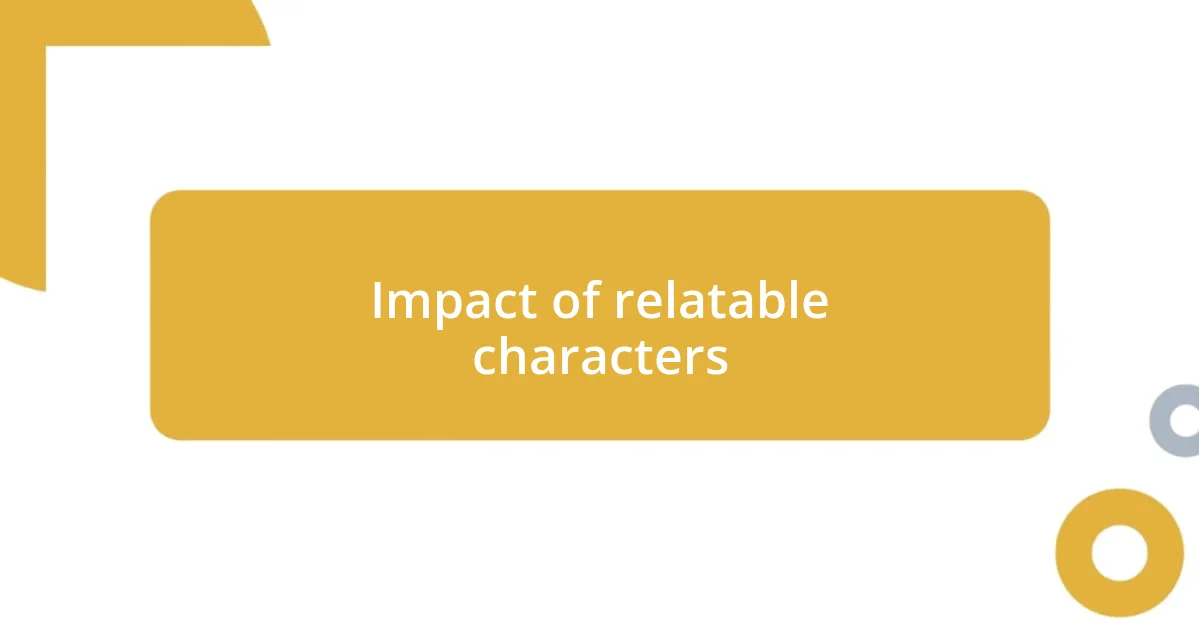
Impact of relatable characters
When I watch a feel-good movie, the characters often become reflections of my own experiences. I remember a film where the lead character faced self-doubt, much like I did during my first job interview. Seeing their journey unfold, from anxious moments to eventual triumph, made me realize I’m not alone in my struggles. It’s incredible how relatable characters can spark a sense of connection within us. Don’t you find it comforting when a character’s feelings resonate with your own?
One of the most potent aspects of relatable characters is that they allow us to explore our emotions safely. I vividly recall watching a movie featuring a single parent juggling work and family life. I felt an immediate bond with them, and it reminded me of my own experience as a caretaker. The character’s challenges made me reflect on my own sacrifices, and in turn, I felt validated. Have you ever felt seen by a character’s journey? It’s hard to understate the comfort that comes from recognizing our own lives within these fictional narratives.
Characters that embody our struggles can significantly influence our emotional responses. I was moved by a film where a young woman overcame societal pressures to follow her dreams. Each moment she hesitated echoed the doubts I faced while pursuing my passions. This connection deepened my engagement with the story and made her eventual success feel like my own victory. Relatable characters, in my experience, transform predictable storylines into captivating journeys that feel profoundly personal. It’s almost as if they speak directly to our hearts, offering solace and encouragement along the way.
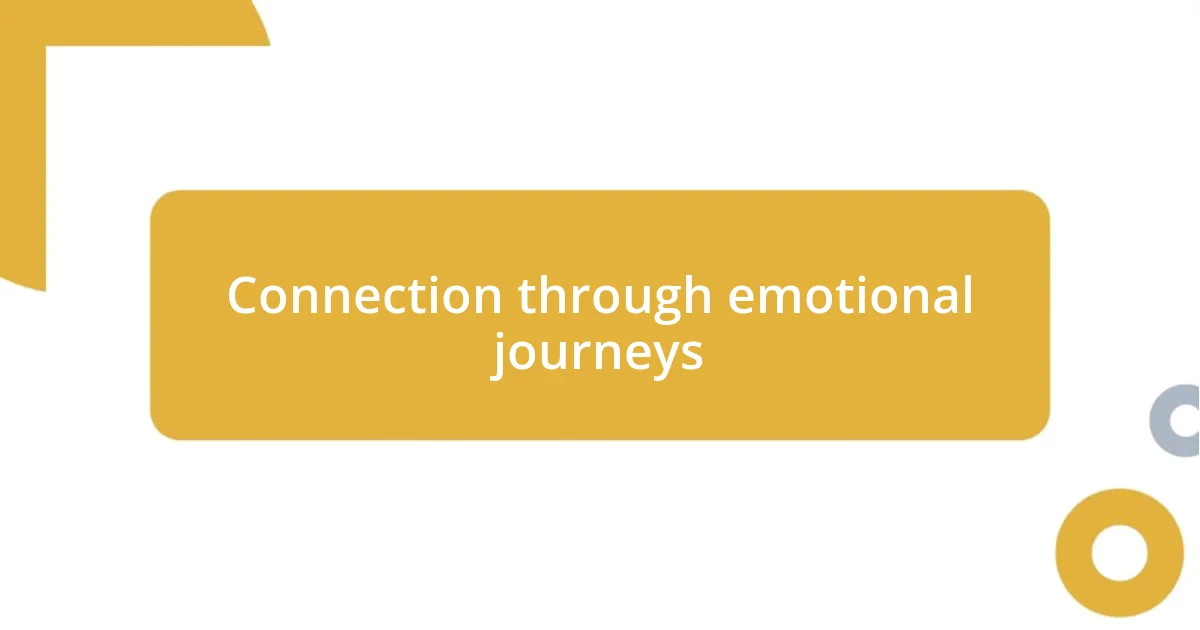
Connection through emotional journeys
There’s something truly powerful about the emotional journeys we embark on while watching feel-good movies. I think back to a film where the main character faced daunting obstacles, reminiscent of the challenges I navigated during a tough period in my life. Every setback they faced felt achingly familiar, and through their journey, I found comfort and strength. Don’t you ever feel a surge of hope seeing someone rise against the odds?
As these characters experience personal growth, it resonates deep within me. I recall a touching scene where a character learns to forgive themselves for past mistakes. Watching their transformation inspired me to reflect on my own need for self-compassion. It’s amazing how a visual narrative can evoke such deep introspection. Have you ever found yourself wishing you could reach into the screen and offer advice to a character? This connection often leads me to reconsider my own life choices, making their journey not just a story, but a catalyst for change in my emotional landscape.
Moreover, these films have a unique ability to create a shared experience among viewers. I remember exiting a theater filled with strangers, yet we all shared the same smiles and tears after a particularly moving scene. That collective emotional response creates a bond; it’s as if we are all part of a larger emotional tapestry. Isn’t it remarkable to think that through storytelling, we can feel understood and connected, even with those we’ve never met? It’s this sense of community, fostered by emotional journeys, that makes feel-good movies an invaluable experience.
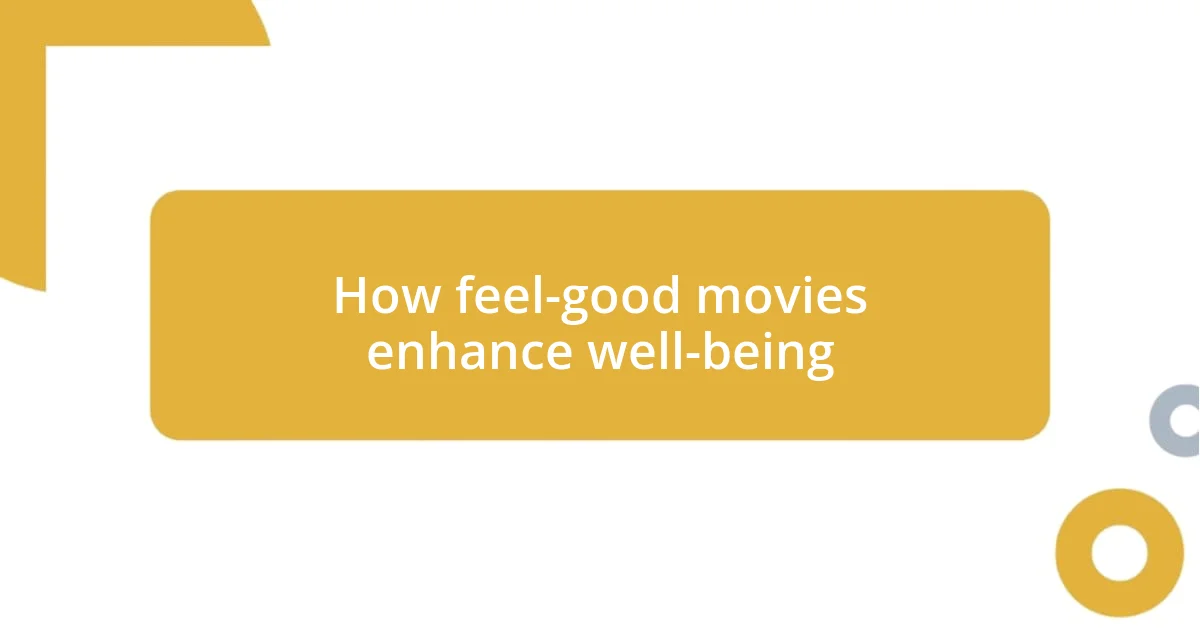
How feel-good movies enhance well-being
Feel-good movies have a remarkable way of lifting our spirits and enhancing our overall well-being. I remember after a long week, I decided to watch a lighthearted comedy. The sheer joy and laughter that erupted from the characters’ antics enveloped me like a warm blanket. Isn’t it amazing how a few smiles on screen can turn a bad day around? This simple act of watching a feel-good film can trigger the release of endorphins—our body’s natural mood lifters.
Additionally, the themes of love, friendship, and perseverance in these films often resonate deeply with us. Once, I saw a movie that beautifully portrayed the importance of community support during tough times. As I watched the characters rally together, I felt an overwhelming sense of gratitude for my own friends and family. Have you ever experienced that rush of appreciation for those who stand by you? This connection to the themes often inspires me to nurture my relationships, reinforcing the idea that we’re better together.
Lastly, there’s a therapeutic quality in reliving comfort stories that provide escapism. I often find solace in revisiting classic feel-good films, returning to that cozy familiarity like an old friend. Recently, I watched a heartwarming edition of a beloved tale that transported me back to simpler times. It made me reminisce about childhood joy, sparking an urge to embrace the small wonders in life again. Isn’t it refreshing to get lost in a story that just makes you feel good? Ultimately, this kind of emotional upliftment plays a significant role in our mental well-being, reminding us of the beauty and resilience of the human spirit.














